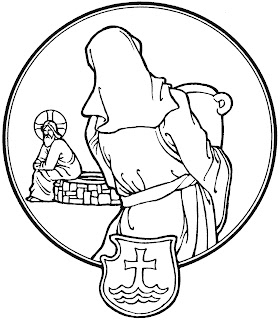PSALM 51
HAVE MERCY ON ME,
ACCORDING TO YOUR STEADFAST LOVE.
In the name + of Jesus.
The sermon for Ash Wednesday is based on Psalm 51, which we chanted to open our Lenten season. There are two verses in Hebrew which generally get overlooked and even omitted when we read Psalm 51. They are:
“To the choirmaster. A Psalm of David, when Nathan the prophet went to him, after he had gone in to Bathsheba.” (Heading in ESV; vv 1-2 in the Hebrew) This heading gives us the background to Psalm 51. It refers to the sin which plagued David his whole life long, and it is the forgiveness of this sin which moved David to compose several Psalms.
While David's adulterous affair and murderous cover-up left him crushed with guilt, David also acknowledged that this sin did not spring up from a momentary lapse of judgment. Like David's sins, many of our own grievous, life-altering sins are the result of one regrettable moment—some alcohol-induced idea; some supposedly reckless flirting which gets stoked into a full-blown affair; some jealous thought which boils over into an onslaught of nasty and cruel words. Though a sinful act may occur in a moment, its consequences may last a lifetime; but sins do not spring up out of thin air. Likewise, David knew that his sin did not come from out of nowhere. And he confessed it to be so.
David pleaded:
“Have mercy on me, O God, according to your steadfast love... For I know my transgressions, and my sin is ever before me. Against you, you only, have I sinned and done what is evil in your sight, so that you may be justified in your words and blameless in your judgment. Behold, I was brought forth in iniquity, and in sin did my mother conceive me.” (Psalm 51:1,3-5)
Sin is always lurking in the human heart. David acknowledged,
“Behold, you delight in truth in the inward being....” (Psalm 51:6) But his heart was not guided by truth. It was full of deceit and self-gratifying sin. We are no different. From the moment we are conceived, we have inherited the nature of our father, Adam. No one has to teach a child to sin. Put one toy in a crib with two children and see what happens. And though we grow older, read books, study hard, and get degrees, we never improve. Put two people in a marital union, and you see half of them end in divorce. Put yourself in the back of a long line in the store and see how much love you have for the person at the check out who needs a price check on bag of fruit. Your spite rises up from your spiteful, sinful heart. We never get any better. Like David, we are sinners.
“Have mercy on me, O God, according to your steadfast love.” (Psalm 51:1) If we treat our sins lightly, it is because we fail to remember what David confesses:
“Against you, you only, have I sinned and done what is evil in your sight....” (Psalm 51:4) Perhaps it is astounding to hear David's confession be so limited. David sinned against Bathsheba by stealing her from her husband and violating her. David sinned against Uriah by arranging to have him killed to cover up his sin. David sinned against Uriah's family, forcing them to bury a loved one in a needless death. David sinned against Israel by deceiving them and sullied the throne. And yet David confessed,
“Against you, you only, have I sinned and done what is evil in your sight....” (Psalm 51:4) While sins often hurt others, every sin is rebellion against God. Sin despises the neighbor God has given us. Sin despises God's gifts as we covet what God has not given us. Sin despises God himself who loves us and calls us to respond with love, but we turn against him. Every sin is rebellion, destructive, and damning.
Our solution for sin and guilt the same as David's: cover-up. Now, if your goal is simply to fool others, then concealing your sins may work. David's cover-up may have fooled some in Jerusalem. His household servants may have played along and pretended not to know of David's sins. But God was not fooled, and God does not play along with our games. Likewise, we may think we can conceal our sins by denying our guilt, by insisting that we are not that bad, or by hoping that no one discovers our secrets. Your friends may play along and pretend you are innocent. Even if you both know better, you both may prefer to believe the lie. But even if you fool others, nothing is hidden before God.
This is what the Lord says:
Whoever conceals his transgressions will not prosper, but he who confesses and forsakes them will obtain mercy. (Proverbs 28:13) If you want to find relief for your heart and comfort for your soul, concealing your guilt will never work. David's conscience did not remain silent. His guilt was crushing. His spirit was broken. It was not until God sent the prophet Nathan that David stopped hiding his sins. Nathan did not manipulate David. He just told him the truth: The Lord knows your sins, and he holds you accountable. Once David had his guilt exposed, he stopped hiding. He stopped pretending. He acknowledged the facts: He was guilty.
“Against you, you only, have I sinned and done what is evil in your sight....” (Psalm 51:4)
Tonight, you are marked with death. Your ashes visibly declare that you are dust and to dust you will return. Being marked with ashes, however, is useless unless you rend your heart, confess your sins, and forsake them. We acknowledge the facts: our hearts are not clean; our spirits are not right; we have sinned and done what is evil in God's sight.
David did not wallow in fear and pity, and neither do we. We plead:
“Have mercy on me, O God, according to your steadfast love.” (Psalm 51:1) If you plead for mercy, you are in no position to bargain for anything. If you plead for mercy, you know you are dead to rights and don't deserve any. But our cry for mercy always hangs on this:
“according to your steadfast love.” (Psalm 51:1) We hold God to his promises. We cry out for our Savior. We plead that God will do the work, that he will cleanse us from guilt, that he will purge us from sin, and that he will make us a new creation. We plead:
“Have mercy on me, O God, according to your steadfast love.” (Psalm 51:1) And he does.
The love of God is steadfast; for the Lord planned our salvation even before he created the heavens and the earth. When Adam and Eve rebelled against God, the Lord remained steadfast in his love—he promised the Savior who would pay for their guilt, destroy the devil's work, and reconcile mankind to himself. Although David's sin was destructive to Uriah, Bathsheba, his nation, and his throne, the Lord's love remained steadfast. The Lord washed David clean, created in him a new heart and a right spirit, and restored the joy of salvation to him. Even though we are guilty and demonstrate our weaknesses with daily sins, the Lord has not turned his love away from us. His love remains steadfast. His mercy endures. And he forgives us.
“Have mercy on me, O God, according to your steadfast love.” (Psalm 51:1) The Lord reveals his steadfast love in the sufferings and death of his Son, Jesus. The Father's mercy upon us moved him to send his Son to receive the blows, the curse, and the death for us. It is not that the Father simply dropped the charges against us; the charges were transferred to his only begotten Son. The Lord has been merciful to you, but Jesus Christ has received what you have earned. The steadfast love of the Son moved him to carry your sin and guilt to the cross. The holy blood which Jesus shed on the cross he shed for you. That blood answers for you. That blood atones for your rebellion. That blood cleanses you of every impurity. The steadfast love of the Spirit moves him to make you a new creation in Jesus' blood. He has driven out the unclean, unbelieving spirit and has created in you a clean heart and a right spirit.
“Have mercy on me, O God, according to your steadfast love.” (Psalm 51:1) And he does. The Lord does not treat you according to your sins and weakness, but according to his steadfast love. That love, poured upon you and in you by the blood of Jesus, continues to strengthen and sustain you. It moves you to forsake your sins, and it restores to you the joy of knowing that your sins are removed from you. You do not need to work on any cover-up for your sin anymore. The blood of Jesus Christ covers you. Your guilt is blotted out.
“Have mercy on me, O God, according to your steadfast love.” (Psalm 51:1) And he does. Therefore, there is joy in the midst of the ashes. Dust and ashes will be raised to life. Salvation stands firm. For his love remains steadfast, and his mercy endures forever.
In the name of the Father and of the Son + and of the Holy Spirit. Amen.








